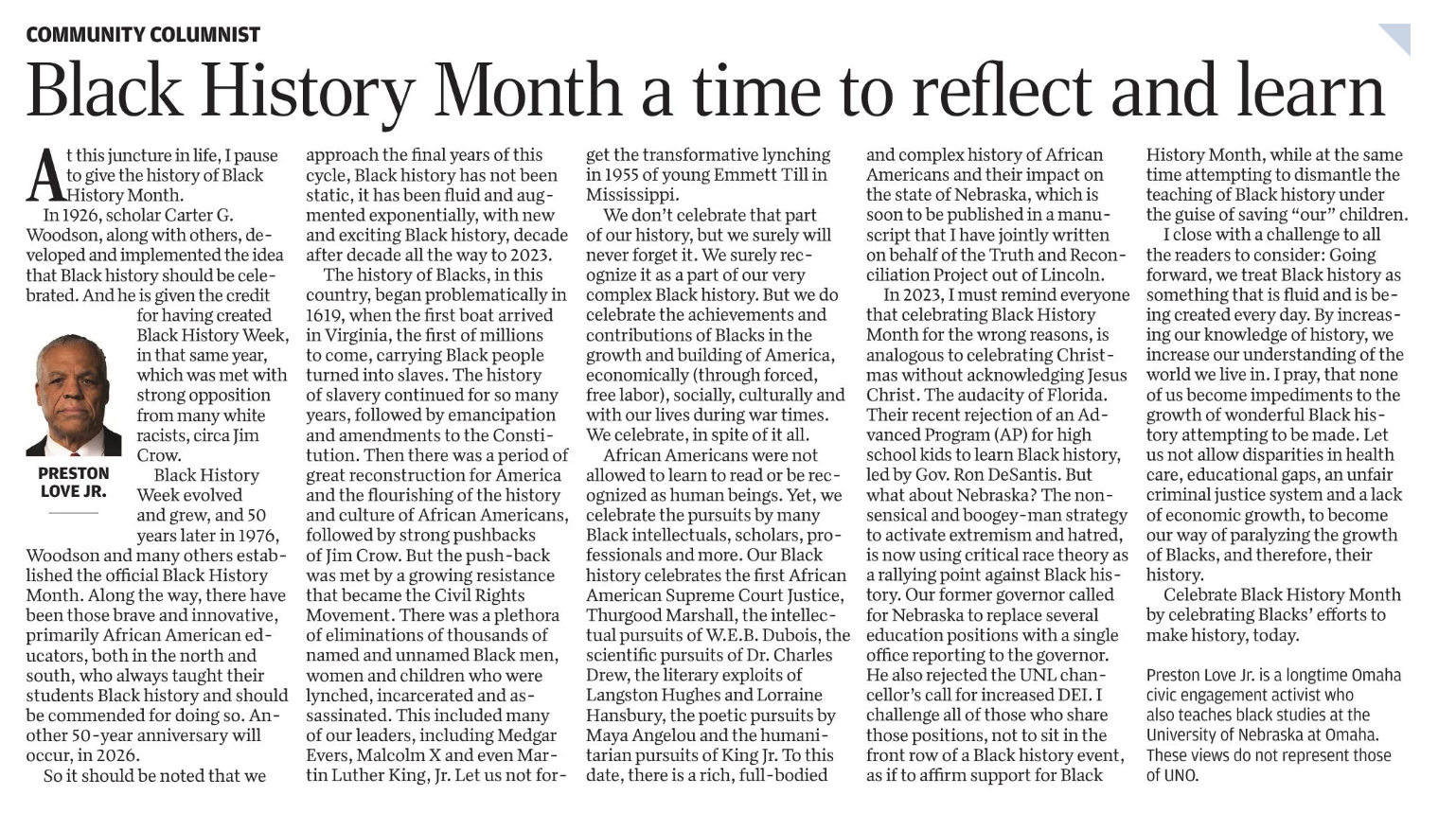
At this juncture in life, I pause to give the history of Black History Month.
In 1926, scholar Carter G. Woodson, along with others, developed and implemented the idea that Black history should be celebrated. And he is given the credit for having created Black History Week, in that same year, which was met with strong opposition from many white racists, circa Jim Crow.
Black History Week evolved and grew, and 50 years later in 1976, Woodson and many others established the official Black History Month. Along the way, there have been those brave and innovative, primarily African American educators, both in the north and south, who always taught their students Black history and should be commended for doing so. Another 50-year anniversary will occur, in 2026.
So it should be noted that we approach the final years of this cycle, Black history has not been static, it has been fluid and augmented exponentially, with new and exciting Black history, decade after decade all the way to 2023.
The history of Blacks, in this country, began problematically in 1619, when the first boat arrived in Virginia, the first of millions to come, carrying Black people turned into slaves. The history of slavery continued for so many years, followed by emancipation and amendments to the Constitution. Then there was a period of great reconstruction for America and the flourishing of the history and culture of African Americans, followed by strong pushbacks of Jim Crow. But the push-back was met by a growing resistance that became the Civil Rights Movement. There was a plethora of eliminations of thousands of named and unnamed Black men, women and children who were lynched, incarcerated and assassinated. This included many of our leaders, including Medgar Evers, Malcolm X and even Martin Luther King, Jr. Let us not forget the transformative lynching in 1955 of young Emmett Till in Mississippi.
We don’t celebrate that part of our history, but we surely will never forget it. We surely recognize it as a part of our very complex Black history. But we do celebrate the achievements and contributions of Blacks in the growth and building of America, economically (through forced, free labor), socially, culturally and with our lives during war times. We celebrate, in spite of it all.
African Americans were not allowed to learn to read or be recognized as human beings. Yet, we celebrate the pursuits by many Black intellectuals, scholars, professionals and more. Our Black history celebrates the first African American Supreme Court Justice, Thurgood Marshall, the intellectual pursuits of W.E.B. Dubois, the scientific pursuits of Dr. Charles Drew, the literary exploits of Langston Hughes and Lorraine Hansbury, the poetic pursuits by Maya Angelou and the humanitarian pursuits of King Jr. To this date, there is a rich, full-bodied and complex history of African Americans and their impact on the state of Nebraska, which is soon to be published in a manuscript that I have jointly written on behalf of the Truth and Reconciliation Project out of Lincoln.
In 2023, I must remind everyone that celebrating Black History Month for the wrong reasons, is analogous to celebrating Christmas without acknowledging Jesus Christ. The audacity of Florida. Their recent rejection of an Advanced Program (AP) for high school kids to learn Black history, led by Gov. Ron DeSantis. But what about Nebraska? The nonsensical and boogey-man strategy to activate extremism and hatred, is now using critical race theory as a rallying point against Black history. Our former governor called for Nebraska to replace several education positions with a single office reporting to the governor. He also rejected the UNL chancellor’s call for increased DEI. I challenge all of those who share those positions, not to sit in the front row of a Black history event, as if to affirm support for Black History Month, while at the same time attempting to dismantle the teaching of Black history under the guise of saving “our” children.
I close with a challenge to all the readers to consider: Going forward, we treat Black history as something that is fluid and is being created every day. By increasing our knowledge of history, we increase our understanding of the world we live in. I pray, that none of us become impediments to the growth of wonderful Black history attempting to be made. Let us not allow disparities in health care, educational gaps, an unfair criminal justice system and a lack of economic growth, to become our way of paralyzing the growth of Blacks, and therefore, their history.
Celebrate Black History Month by celebrating Blacks’ efforts to make history, today.
